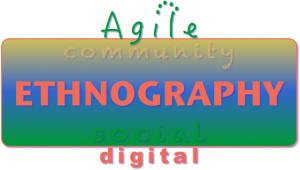 Agile Digital Ethnography uses an ethnographic research approach to analyze people’s online interactions. It creates a dynamic new market research capability that’s useful by itself and even more when used with surveys, focus groups, field work, and other primary research. Agile Digital Ethnography uses an ethnographic research approach to analyze people’s online interactions. It creates a dynamic new market research capability that’s useful by itself and even more when used with surveys, focus groups, field work, and other primary research.
I have learned that Agile Digital Ethnography provides a unique combination of research results. I have used it on client engagements since 2006. Like primary research, it reveals people’s behavior, thoughts, emotions, and motivations in rich detail; however, because it’s secondary research, it’s faster and less costly than most other methods. It’s very useful when it’s conducted before primary research since its results can inform the design of primary research instruments.
[…]
 Ethnographic research for cross border business shows how to apply ethnographic research of social media to reducing the risks and costs of doing cross border business and deals. Ethnographic research can transform the value proposition of international business because it’s a very efficient way to conduct due diligence, to study the behavior and motivations of the people that the deal proposes to serve. Unlike traditional research methods, which are relatively slow, costly and qualitative, ethnographic research of social media combines qualitative richness with quantitative analysis. It’s faster and less costly, too. Ethnographic research for cross border business shows how to apply ethnographic research of social media to reducing the risks and costs of doing cross border business and deals. Ethnographic research can transform the value proposition of international business because it’s a very efficient way to conduct due diligence, to study the behavior and motivations of the people that the deal proposes to serve. Unlike traditional research methods, which are relatively slow, costly and qualitative, ethnographic research of social media combines qualitative richness with quantitative analysis. It’s faster and less costly, too.
Ethnographic research for cross border business can dramatically improve the depth and breadth of research for business and corporate strategy, market entry strategy, customer development, human capital strategy, product management, and others since it allows teams to consider more users and to assess their behavior and motivations, which can improve the value of more costly research.
Imagine that you can get deep qualitative and quantitative data on what your proposed clients, customers, employees and partners are discussing among themselves, specifically about the business scenario you propose to address. Ethnographic allows you to validate, with real people, […]
 Employee engagement and experiential social media shares my insights into one of the biggest challenges faced by business today—the employee engagement crisis, and how firms can change the game. Fewer than a quarter of employees are engaged, a slightly smaller quarter are “actively disengaged,” and the majority is blasé and punches the clock. Employee engagement and experiential social media shares my insights into one of the biggest challenges faced by business today—the employee engagement crisis, and how firms can change the game. Fewer than a quarter of employees are engaged, a slightly smaller quarter are “actively disengaged,” and the majority is blasé and punches the clock.
If you’d like to watch this post instead of reading it, click the thumbnail button.
[…]
 Ethnographic research for design explains how to use advances in ethnographic research of social media to design products, services, experiences… anything—while getting better results at lower risk. Ethnographic research of social media is breakthrough for designers in the “design stack” in which I’ve includedArchitecture/Interior Design, Product Design, User Experience Design/Interaction Design, UX Strategy, Service Design and Customer Experience Design. Ethnographic research for design explains how to use advances in ethnographic research of social media to design products, services, experiences… anything—while getting better results at lower risk. Ethnographic research of social media is breakthrough for designers in the “design stack” in which I’ve includedArchitecture/Interior Design, Product Design, User Experience Design/Interaction Design, UX Strategy, Service Design and Customer Experience Design.
Designers in all fields lament clients’ resistance to funding robust research. Traditional design research methods are often grounded in asking proposed users explicit questions, and self-reported responses vary significantly from actual behavior despite respondents’ best intentions. Similarly, shadowing, service safaris, “a day in the life,” and other analog research methods are costly and slow. Sample sizes are necessarily small because scaling analog methods greatly multiplies the budget and length of the research phase. Ethnographic research of social media changes the game because it studies proposed users’ actual behavior in digital public when they’re having heated discussions about the outcomes they want when the proposed product, service, or process is useful to them. It […]
 Behavioral economics autonomy and ethics is a thought experiment on how to approach “doing good” when applying the emerging practice of behavioral economics. Along with big data analytics and cognitive science, behavioral economics affords businesses, governments and other organizations unprecedented impact on individuals’ behavior, even without their consent or awareness. This arouses serious ethical and social dilemmas. Behavioral economics autonomy and ethics is a thought experiment on how to approach “doing good” when applying the emerging practice of behavioral economics. Along with big data analytics and cognitive science, behavioral economics affords businesses, governments and other organizations unprecedented impact on individuals’ behavior, even without their consent or awareness. This arouses serious ethical and social dilemmas.
Every behavioral economics practitioner I’ve met has emphasized the importance of using its practice “for good” in order to help people. Like all other human endeavors, however, “for good” is open to interpretation, so I’ll apply my experience with ethnographic and behavioral analysis of social media to reflect on what “for good” might mean in light of individual and group autonomy.
I also hope this Noodle will be food for thought for executives who hire behavioral economics firms as well as all of us who are invariably its subject. In a similar vein, most designers I know are committed to using design principles to improve user experience, and there’s considerable overlap between design and behavioral economics.
Behavioral economics is […]
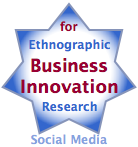 Ethnographic research for business innovation shows how to apply ethnographic research of social media to managing controlled disruption within organizations. Ethnographic research of social media can transform the entire innovation process because it’s a very efficient way to study the behavior and motivations of the people that the innovation proposes to serve. Unlike traditional innovation and ethnographic research methods, which are relatively slow, costly and qualitative, ethnographic research of social media combines qualitative richness with quantitative analysis. It’s faster and less costly, too. Ethnographic research for business innovation shows how to apply ethnographic research of social media to managing controlled disruption within organizations. Ethnographic research of social media can transform the entire innovation process because it’s a very efficient way to study the behavior and motivations of the people that the innovation proposes to serve. Unlike traditional innovation and ethnographic research methods, which are relatively slow, costly and qualitative, ethnographic research of social media combines qualitative richness with quantitative analysis. It’s faster and less costly, too.
Ethnographic research for business innovation can dramatically improve the depth and breadth of business and corporate strategy, business design and service design research since it allows teams to consider more users and to assess their behavior and motivations, which can improve the value of more costly research.
This post outlines the business innovation use case of ethnographic research of social media, and it includes examples in banking, professional services, consumer products, and B2B marketing. For more on ethnographic research, see More Resources below.
[…]
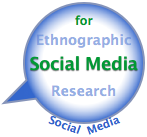 Ethnographic research for social media initiatives shows how ethnography can change the rules of social media programs in marketing, customer service, product development, recruiting and others. Ethnographic research enables teams to understand the people who are most important to your firm so they can relate to them at a completely different level. Moreover, interacting in digital public activates the network effect and the annuity effect, so it’s very scalable. Since your teams interact in digital public, where a far larger group of like people observes the interactions, they influence a large group of people and build relationships with them. People start trusting your firm, preferring your firm, and doing more business with you. See the Trust Business Chain Reaction and infographic for how it monetizes. Ethnographic research for social media initiatives shows how ethnography can change the rules of social media programs in marketing, customer service, product development, recruiting and others. Ethnographic research enables teams to understand the people who are most important to your firm so they can relate to them at a completely different level. Moreover, interacting in digital public activates the network effect and the annuity effect, so it’s very scalable. Since your teams interact in digital public, where a far larger group of like people observes the interactions, they influence a large group of people and build relationships with them. People start trusting your firm, preferring your firm, and doing more business with you. See the Trust Business Chain Reaction and infographic for how it monetizes.
Ethnographic research for social media initiatives is a game-changer for customer experience and digital transformation programs in multiple phases. It’s faster, less costly, and scalable. It provides an unprecedented combination of qualitative and quantitative research.
[…]
 The connected car and customer experience reveals a new opportunity for carmakers to dial into real customer behavior and desires around connected cars and autonomous cars. The Connected car and the autonomous car are powerful services that will help transform how people move around, and they are emerging during an era of unprecedented volatility in markets. I’ll wager that there’s never been a better or more challenging time to be a carmaker because opportunities and threats have never been higher. I’ve been fortunate to meet product managers and engineers who are pioneering connected and autonomous car services. I’ve also been meeting leaders in the Internet of Things (smart devices), of which the connected car is a part. The connected car and customer experience reveals a new opportunity for carmakers to dial into real customer behavior and desires around connected cars and autonomous cars. The Connected car and the autonomous car are powerful services that will help transform how people move around, and they are emerging during an era of unprecedented volatility in markets. I’ll wager that there’s never been a better or more challenging time to be a carmaker because opportunities and threats have never been higher. I’ve been fortunate to meet product managers and engineers who are pioneering connected and autonomous car services. I’ve also been meeting leaders in the Internet of Things (smart devices), of which the connected car is a part.
My crystal ball says that the connected car is a bet-the-brand proposition for carmakers because it directly addresses competing on customer experience, the most disruptive trend of all. As I detailed in The Social Channel, we have moved from a product/service-based economy toward an experience economy. Even IT analyst Gartner has proclaimed that customer experience is the final battleground for firms. […]
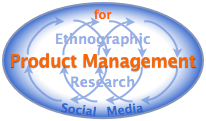 Ethnographic research for product management shows how to apply ethnographic research of social media to managing the life cycle of products and services. Ethnographic research of social media can revolutionize product management because it’s a very efficient way to study people’s behavior and motivations in each part of the product life cycle. Unlike traditional product and ethnographic research methods, which are relatively slow, costly and qualitative, ethnographic research of social media combines qualitative richness with quantitative analysis. It’s faster and less costly, too. Ethnographic research for product management shows how to apply ethnographic research of social media to managing the life cycle of products and services. Ethnographic research of social media can revolutionize product management because it’s a very efficient way to study people’s behavior and motivations in each part of the product life cycle. Unlike traditional product and ethnographic research methods, which are relatively slow, costly and qualitative, ethnographic research of social media combines qualitative richness with quantitative analysis. It’s faster and less costly, too.
This post outlines the product management use case of ethnographic research of social media. For more on ethnographic research, see its executive summary.
[…]
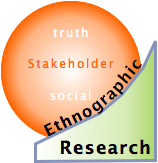 [Updated] Ethnographic research of social media is one of my biggest secrets. It has become the foundation of CSRA’s ability to create trust at scale, so here I’ll share how I came to use it with social media. Then I’ll explain what ethnographic research is, why it’s vital to CSRA, and how it works, so you can use it. Finally, I’ll share use cases for experiential social media, product management, business innovation, and cross-border business. [Updated] Ethnographic research of social media is one of my biggest secrets. It has become the foundation of CSRA’s ability to create trust at scale, so here I’ll share how I came to use it with social media. Then I’ll explain what ethnographic research is, why it’s vital to CSRA, and how it works, so you can use it. Finally, I’ll share use cases for experiential social media, product management, business innovation, and cross-border business.
[…]
|
|
 Agile Digital Ethnography uses an ethnographic research approach to analyze people’s online interactions. It creates a dynamic new market research capability that’s useful by itself and even more when used with surveys, focus groups, field work, and other primary research.
Agile Digital Ethnography uses an ethnographic research approach to analyze people’s online interactions. It creates a dynamic new market research capability that’s useful by itself and even more when used with surveys, focus groups, field work, and other primary research.
 Ethnographic research for cross border business shows how to apply ethnographic research of social media to reducing the risks and costs of doing cross border business and deals. Ethnographic research can transform the value proposition of international business because it’s a very efficient way to conduct due diligence, to study the behavior and motivations of the people that the deal proposes to serve. Unlike traditional research methods, which are relatively slow, costly and qualitative, ethnographic research of social media combines qualitative richness with quantitative analysis. It’s faster and less costly, too.
Ethnographic research for cross border business shows how to apply ethnographic research of social media to reducing the risks and costs of doing cross border business and deals. Ethnographic research can transform the value proposition of international business because it’s a very efficient way to conduct due diligence, to study the behavior and motivations of the people that the deal proposes to serve. Unlike traditional research methods, which are relatively slow, costly and qualitative, ethnographic research of social media combines qualitative richness with quantitative analysis. It’s faster and less costly, too. Employee engagement and experiential social media shares my insights into one of the biggest challenges faced by business today—the employee engagement crisis, and how firms can change the game. Fewer than a quarter of employees are engaged, a slightly smaller quarter are “actively disengaged,” and the majority is blasé and punches the clock.
Employee engagement and experiential social media shares my insights into one of the biggest challenges faced by business today—the employee engagement crisis, and how firms can change the game. Fewer than a quarter of employees are engaged, a slightly smaller quarter are “actively disengaged,” and the majority is blasé and punches the clock. Ethnographic research for design explains how to use advances in ethnographic research of social media to design products, services, experiences… anything—while getting better results at lower risk. Ethnographic research of social media is breakthrough for designers in the “design stack” in which I’ve includedArchitecture/Interior Design, Product Design, User Experience Design/Interaction Design, UX Strategy, Service Design and Customer Experience Design.
Ethnographic research for design explains how to use advances in ethnographic research of social media to design products, services, experiences… anything—while getting better results at lower risk. Ethnographic research of social media is breakthrough for designers in the “design stack” in which I’ve includedArchitecture/Interior Design, Product Design, User Experience Design/Interaction Design, UX Strategy, Service Design and Customer Experience Design. Behavioral economics autonomy and ethics is a thought experiment on how to approach “doing good” when applying the emerging practice of behavioral economics. Along with big data analytics and cognitive science, behavioral economics affords businesses, governments and other organizations unprecedented impact on individuals’ behavior, even without their consent or awareness. This arouses serious ethical and social dilemmas.
Behavioral economics autonomy and ethics is a thought experiment on how to approach “doing good” when applying the emerging practice of behavioral economics. Along with big data analytics and cognitive science, behavioral economics affords businesses, governments and other organizations unprecedented impact on individuals’ behavior, even without their consent or awareness. This arouses serious ethical and social dilemmas. Ethnographic research for business innovation shows how to apply ethnographic research of social media to managing controlled disruption within organizations. Ethnographic research of social media can transform the entire innovation process because it’s a very efficient way to study the behavior and motivations of the people that the innovation proposes to serve. Unlike traditional innovation and ethnographic research methods, which are relatively slow, costly and qualitative, ethnographic research of social media combines qualitative richness with quantitative analysis. It’s faster and less costly, too.
Ethnographic research for business innovation shows how to apply ethnographic research of social media to managing controlled disruption within organizations. Ethnographic research of social media can transform the entire innovation process because it’s a very efficient way to study the behavior and motivations of the people that the innovation proposes to serve. Unlike traditional innovation and ethnographic research methods, which are relatively slow, costly and qualitative, ethnographic research of social media combines qualitative richness with quantitative analysis. It’s faster and less costly, too. Ethnographic research for social media initiatives shows how ethnography can change the rules of social media programs in marketing, customer service, product development, recruiting and others. Ethnographic research enables teams to understand the people who are most important to your firm so they can relate to them at a completely different level. Moreover, interacting in digital public activates the network effect and the annuity effect, so it’s very scalable. Since your teams interact in digital public, where a far larger group of like people observes the interactions, they influence a large group of people and build relationships with them. People start trusting your firm, preferring your firm, and doing more business with you. See the Trust Business Chain Reaction and infographic for how it monetizes.
Ethnographic research for social media initiatives shows how ethnography can change the rules of social media programs in marketing, customer service, product development, recruiting and others. Ethnographic research enables teams to understand the people who are most important to your firm so they can relate to them at a completely different level. Moreover, interacting in digital public activates the network effect and the annuity effect, so it’s very scalable. Since your teams interact in digital public, where a far larger group of like people observes the interactions, they influence a large group of people and build relationships with them. People start trusting your firm, preferring your firm, and doing more business with you. See the Trust Business Chain Reaction and infographic for how it monetizes. The connected car and customer experience reveals a new opportunity for carmakers to dial into real customer behavior and desires around connected cars and autonomous cars. The Connected car and the autonomous car are powerful services that will help transform how people move around, and they are emerging during an era of unprecedented volatility in markets. I’ll wager that there’s never been a better or more challenging time to be a carmaker because opportunities and threats have never been higher. I’ve been fortunate to meet product managers and engineers who are pioneering connected and autonomous car services. I’ve also been meeting leaders in the Internet of Things (smart devices), of which the connected car is a part.
The connected car and customer experience reveals a new opportunity for carmakers to dial into real customer behavior and desires around connected cars and autonomous cars. The Connected car and the autonomous car are powerful services that will help transform how people move around, and they are emerging during an era of unprecedented volatility in markets. I’ll wager that there’s never been a better or more challenging time to be a carmaker because opportunities and threats have never been higher. I’ve been fortunate to meet product managers and engineers who are pioneering connected and autonomous car services. I’ve also been meeting leaders in the Internet of Things (smart devices), of which the connected car is a part. Ethnographic research for product management shows how to apply ethnographic research of social media to managing the life cycle of products and services. Ethnographic research of social media can revolutionize product management because it’s a very efficient way to study people’s behavior and motivations in each part of the product life cycle. Unlike traditional product and ethnographic research methods, which are relatively slow, costly and qualitative, ethnographic research of social media combines qualitative richness with quantitative analysis. It’s faster and less costly, too.
Ethnographic research for product management shows how to apply ethnographic research of social media to managing the life cycle of products and services. Ethnographic research of social media can revolutionize product management because it’s a very efficient way to study people’s behavior and motivations in each part of the product life cycle. Unlike traditional product and ethnographic research methods, which are relatively slow, costly and qualitative, ethnographic research of social media combines qualitative richness with quantitative analysis. It’s faster and less costly, too. [Updated] Ethnographic research of social media is one of my biggest secrets. It has become the foundation of CSRA’s ability to create trust at scale, so here I’ll share how I came to use it with social media. Then I’ll explain what ethnographic research is, why it’s vital to CSRA, and how it works, so you can use it. Finally, I’ll share use cases for experiential social media, product management, business innovation, and cross-border business.
[Updated] Ethnographic research of social media is one of my biggest secrets. It has become the foundation of CSRA’s ability to create trust at scale, so here I’ll share how I came to use it with social media. Then I’ll explain what ethnographic research is, why it’s vital to CSRA, and how it works, so you can use it. Finally, I’ll share use cases for experiential social media, product management, business innovation, and cross-border business.